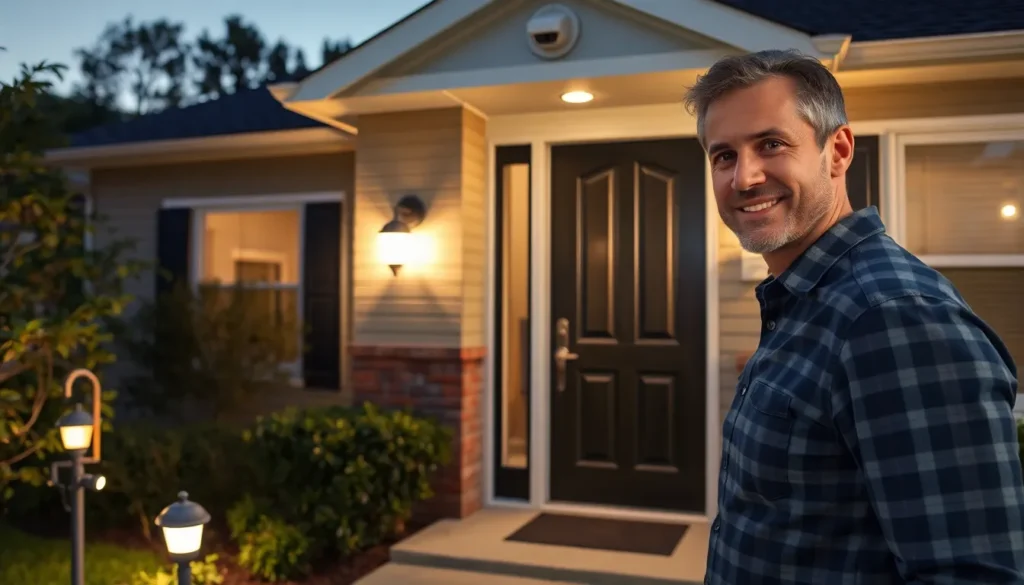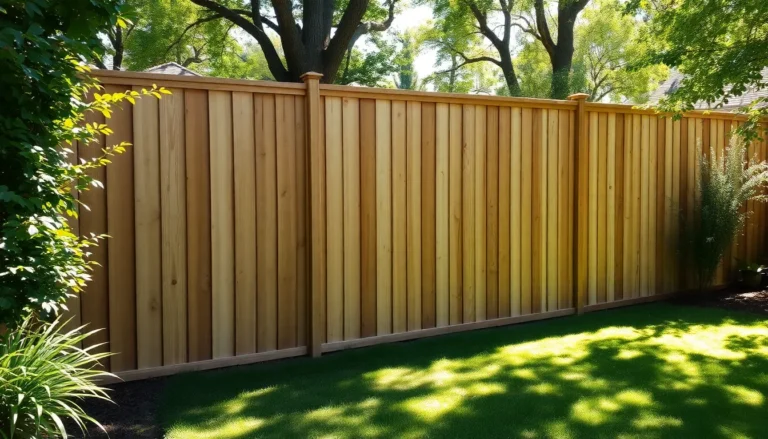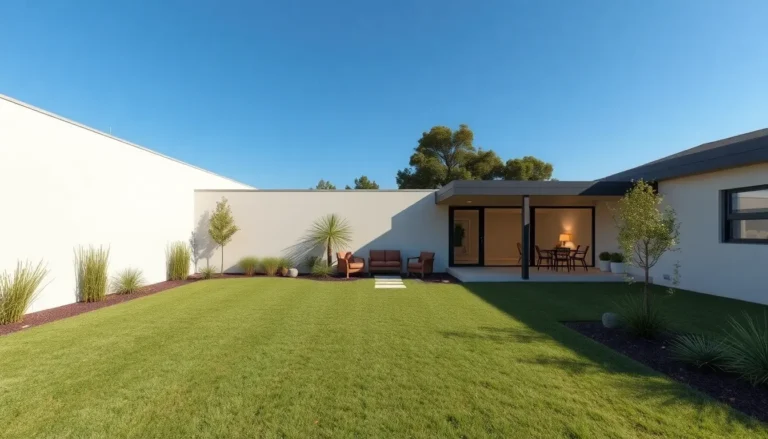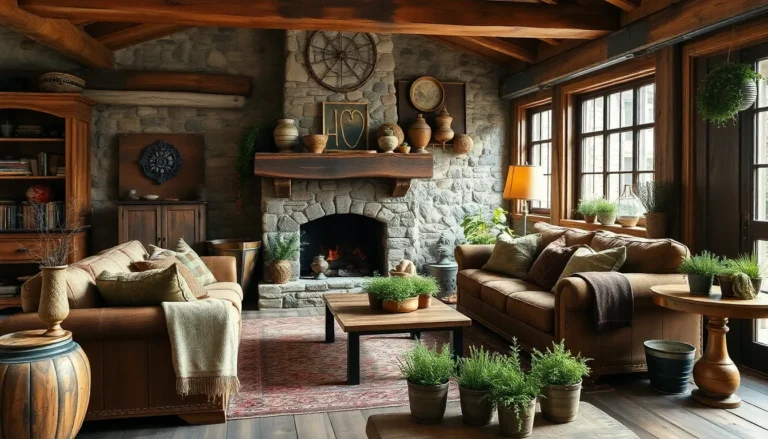Table of Contents
ToggleIn an increasingly unpredictable world, ensuring the safety of one’s home has never been more crucial. With rising concerns about burglary and property crime, homeowners are seeking effective ways to protect their families and belongings. A secure home not only provides peace of mind but also enhances the overall quality of life.
Implementing practical home security tips can significantly reduce the risk of break-ins and create a safer environment. From simple measures like installing quality locks to more advanced solutions such as smart security systems, there are numerous strategies available. This article explores essential tips that empower homeowners to take charge of their safety and fortify their living spaces against potential threats.
Essential Home Security Tips
Homeowners can adopt several strategies to enhance their security measures. Focusing on vulnerabilities and alarm systems plays a crucial role in protecting households.
Assessing Your Home’s Vulnerabilities
Evaluating a home’s weak points helps identify areas needing improvement. Homeowners should:
- Inspect doors for strength and durability; consider deadbolts for added security.
- Examine windows for potential entry points; install window locks or security film.
- Evaluate outdoor lighting; use motion-activated lights to deter intruders.
- Assess landscaping; trim shrubs near entryways to eliminate hiding spots.
- Review garage security; secure garage doors and consider alarms for openings.
Importance of an Alarm System
An effective alarm system offers significant protection against break-ins. Homeowners benefit by:
- Providing immediate alerts; alarms notify homeowners and deter burglars.
- Offering 24/7 monitoring services; professional monitoring provides peace of mind.
- Integrating with smart home devices; allowing remote access enhances security.
- Increasing home insurance discounts; insurers often lower premiums for homes with security systems.
- Serving as a visible deterrent; prominently displayed signs can dissuade potential threats.
Implementing these essential security measures reinforces a home’s defenses, contributing to a safer living environment.
Choosing the Right Locks
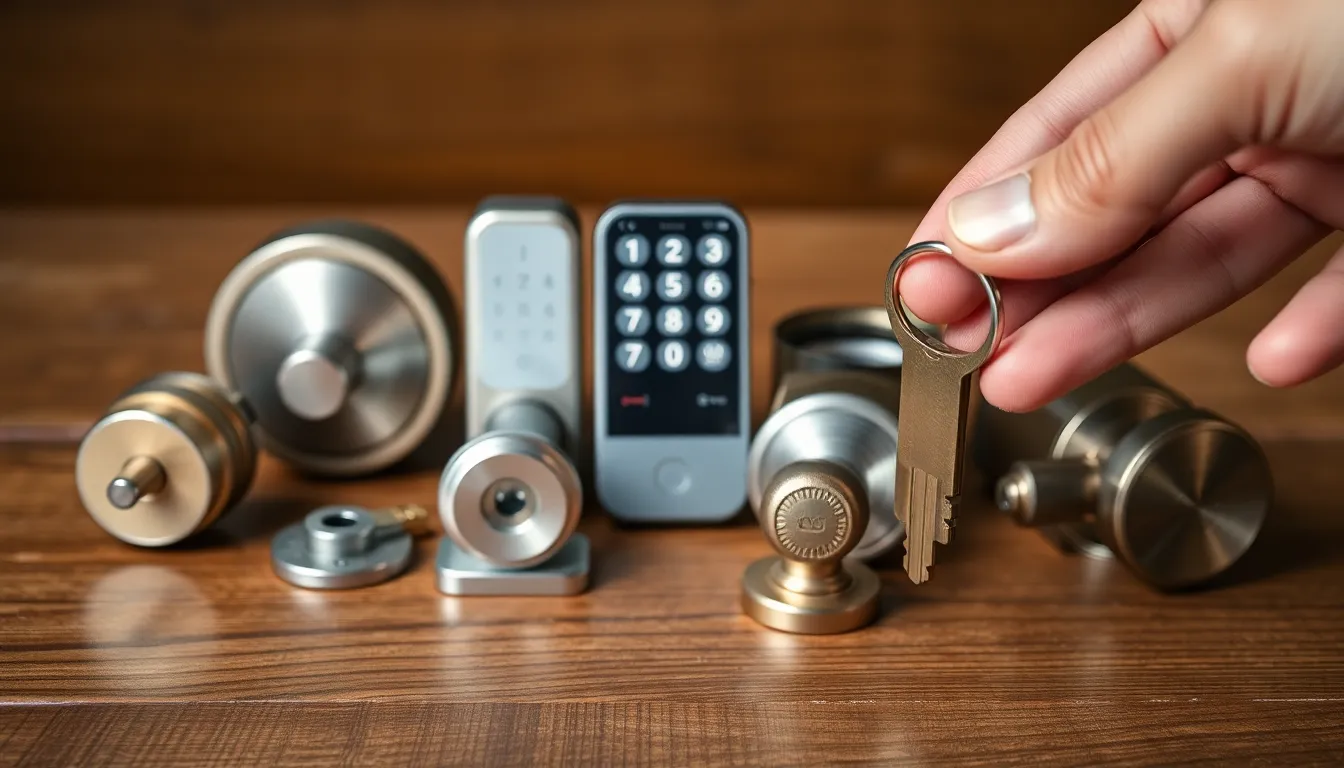
Selecting appropriate locks significantly enhances home security. Various types exist, each offering distinct features and benefits.
Types of Locks to Consider
- Deadbolt Locks: Provide superior protection and require a key for entry. They resist tampering better than standard spring bolt locks.
- Smart Locks: Offer keyless entry and can be controlled through mobile devices. Features often include remote locking and unlocking, along with activity logs.
- Knob Locks: Commonly used on interior doors, these lack the strength for exterior doors. They should supplement other lock types for external entry points.
- Lever Handle Locks: Typically found in commercial settings, these locks provide ease of access. They may lack security features necessary for residential use.
- Vertical Deadbolts: Mounted on the door edge, these locks resist forcing and provide added security in high-risk areas.
Rekeying vs. Replacing Locks
Rekeying and replacing locks both enhance security but serve different purposes.
- Rekeying: A cost-effective option that involves changing the internal mechanism of an existing lock. This allows new keys to work while the old keys become ineffective. Ideal for situations like moving into a new home.
- Replacing Locks: Involves removing old locks and installing new ones. Necessary for locks damaged by weather, tampering, or wear. Consider upgrading to more secure lock types during this process.
By understanding lock types and their rekeying or replacement needs, homeowners can make informed choices to fortify their properties effectively.
Securing Windows and Doors
Securing windows and doors plays a critical role in home safety. Implementing effective measures can significantly reduce the risk of unauthorized entry.
Installing Window Bars
Installing window bars provides an added layer of security against break-ins. Window bars come in various styles, ensuring they blend with home aesthetics. They typically feature:
- Steel construction for durability and resistance to tampering.
- Horizontal and vertical bars that deter climbers by creating barriers.
- Quick-release mechanisms for emergency escape, ensuring safety during emergencies.
Choosing the right window bars involves assessing the type of windows and the crime rate in the neighborhood. Proper installation by a professional enhances effectiveness.
Benefits of Smart Locks
Smart locks offer advanced security features that enhance traditional locking systems. Key benefits include:
- Remote access allows homeowners to lock or unlock doors from anywhere via smartphone apps.
- Keyless entry eliminates the need for physical keys, reducing risks associated with lost or stolen keys.
- User access management enables homeowners to grant temporary access to guests or service providers.
- Audit trails provide logs of who accessed the home and when, improving accountability.
- Integration with home automation systems helps streamline security measures alongside other smart devices.
Opting for smart locks combines convenience with heightened security, making them an excellent choice for modern homes.
Outdoor Security Measures
Effective outdoor security measures significantly enhance a home’s safety. By implementing strategic actions, homeowners can deter intruders and protect their property.
Importance of Outdoor Lighting
Outdoor lighting serves as a crucial component of home security. It illuminates dark areas around a property, reducing hiding spots for potential intruders.
- Motion Sensor Lights: Motion sensor lights activate upon detecting movement, alerting homeowners and deterring intruders from approaching.
- Pathway and Landscape Lighting: Installing lights along pathways and in gardens increases visibility while adding aesthetic value.
- Flood Lights: High-intensity flood lights provide comprehensive illumination, enhancing security in large outdoor spaces.
Homeowners should position lights near entry points, driveways, and garages for maximum effectiveness. Regularly checking and maintaining these lights ensures they function efficiently, preventing dark zones.
Utilizing Surveillance Cameras
Surveillance cameras act as a strong deterrent against criminal activity. They provide valuable evidence in case of a crime and can discourage intruders from attempting to breach a property.
- Visible Cameras: Placing visible cameras in prominent locations, such as front entries and backyards, increases their deterring effects.
- High-Definition Video Quality: Selecting high-definition cameras enhances image clarity, facilitating easier identification of potential intruders.
- Remote Monitoring: Opting for cameras with remote access allows homeowners to monitor their property from anywhere, enhancing peace of mind.
Integrating cameras with motion detection alerts ensures immediate notification of suspicious activity. Additionally, choosing weather-resistant models prolongs camera life and effectiveness.
Creating a Home Security Plan
A comprehensive home security plan enhances protection against potential threats. Homeowners should implement strategies that foster community involvement and ensure security measures remain effective.
Involving Neighbors in Security
Involving neighbors strengthens a community’s overall security. Forming a neighborhood watch program fosters communication and awareness among residents. Organizing regular meetings allows homeowners to share concerns and discuss suspicious activities. Utilizing shared resources, such as surveillance cameras or alarm systems, can reduce costs and improve efficacy. Building relationships also encourages each member to look out for one another, creating a united front against crime.
Regularly Updating Your Security Measures
Regularly updating security measures ensures effectiveness against evolving threats. Homeowners should conduct periodic security assessments to identify vulnerabilities. Security systems may require upgrades or replacements as technology advances. For instance, modern systems can integrate smart home devices, enhancing convenience and control. Keeping locksmith information current helps maintain the integrity of locks and keys. Engaging in ongoing education about new security products or techniques also informs homeowners about additional options for improving safety.
Conclusion
Prioritizing home security is essential for protecting loved ones and valuable possessions. By implementing a combination of basic and advanced measures homeowners can significantly reduce the risk of burglary. Regular assessments and updates to security systems ensure that homes remain fortified against evolving threats.
Engaging with the community through neighborhood watch programs fosters a collective approach to safety. Staying informed about the latest security technologies and practices empowers homeowners to make informed decisions. A proactive stance on home security not only enhances safety but also contributes to a more secure and peaceful living environment.
